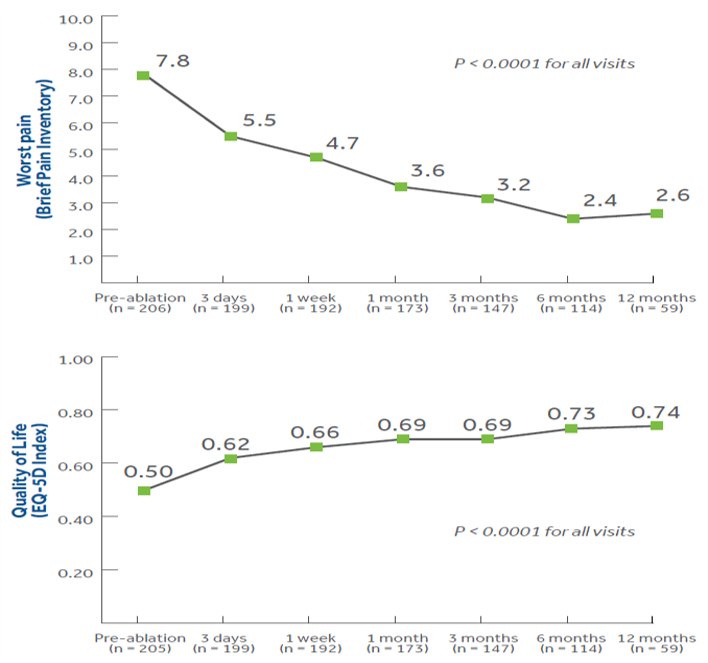Minimally Invasive Treatment Provides Better Quality of Life for Patients with Debilitating Bone Tumors
 A new study to be presented at the Society of Interventional Radiology Annual Scientific Meeting shows that radiofrequency ablation (RFA) is effective in providing relief in as little as three days, and the benefits last more than 12 months—a significant improvement over radiation treatment.
A new study to be presented at the Society of Interventional Radiology Annual Scientific Meeting shows that radiofrequency ablation (RFA) is effective in providing relief in as little as three days, and the benefits last more than 12 months—a significant improvement over radiation treatment.
Researchers enrolled 218 cancer patients at 15 sites around the world between October 2017 and February 2020. Patients completed questionnaires to measure their quality of life and pain levels prior to the procedure, three days after and then intermittently through the one-year mark. Researchers used both the five-level EurolQol scale and the European Organization for Research and Treatment of Cancer Quality of Life (EORTC) measurement.
Significant improvements were seen in 59 subjects who completed the EurolQol at 12 months and similar improvements were seen for 14 patients who completed the 12-month EORTC Qol. Because of the palliative nature of the treatment, many patients were unable to be surveyed through the entire 12-month milestone.
“Commonly used radiation treatments can take weeks to provide pain relief,” said Jason R. Levy, MD, a vascular and interventional radiologist at Northside Hospital in Atlanta and lead researcher of the study. “A few weeks can represent a large portion of the remaining life in these patients, and RFA may be able to give them the best quality of life possible in the time they have left.”
The research focused on lytic bone metastases, a common type of bone tumor found in many cancer patients, making the treatment an option for a wide range of cancer patients. Predominant initial cancers in this study were breast, lung and kidney. A limitation of the study was that many patients were lost to follow-up due to deaths related to the underlying cancer.
“What set our results apart from prior research is the sheer speed and durability of this treatment,” said Levy. “As a result, we believe this treatment should be available to more patients with metastatic cancer earlier in their treatment path.
Abstract 78: Improvement in Quality of Life in Patients Treated for Painful Osseous Metastases With Radiofrequency Ablation: The Opus One Study. J. Levy, E. David, T. Hopkins, J. Morris, N. Tran, H. Farid, F. Massari, W. O’Connell, A. Vogel, A. Gangi, P. Sunenshine, R. Dixon, S. Bagla. Annual Scientific Meeting, March 20–26, 2021. This abstract can be found at sirmeeting.org after the embargo time.
Related Articles
Citation
Minimally Invasive Treatment Provides Better Quality of Life for Patients with Debilitating Bone Tumors. Appl Radiol.
March 22, 2021